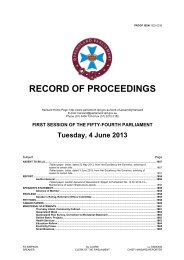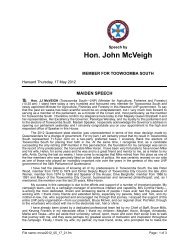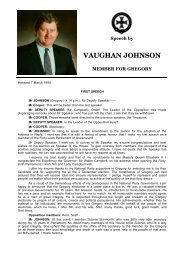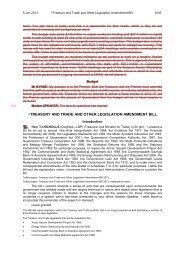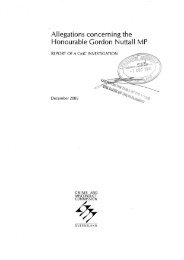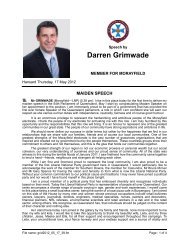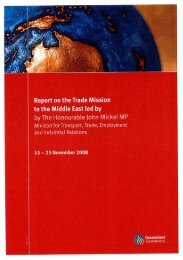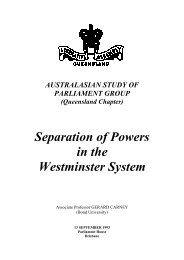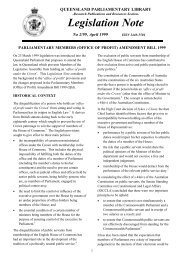weekly hansard - Queensland Parliament - Queensland Government
weekly hansard - Queensland Parliament - Queensland Government
weekly hansard - Queensland Parliament - Queensland Government
Create successful ePaper yourself
Turn your PDF publications into a flip-book with our unique Google optimized e-Paper software.
2588 Succession Amendment Bill 23 Aug 2005<br />
• The applicant’s testamentary proposal is or may be what the person would have done if he or she had testamentary<br />
capacity; and<br />
• It is or may be appropriate for an order to be made in relation to the person.<br />
Once leave has been granted, the next stage is for the court to consider the actual application. In this regard, the Bill allows for the<br />
merger of the leave application and the application proper.<br />
Before it makes an order, the court must be satisfied that the person is in fact incapable of making a will and that the proposed will<br />
reflects what he or she would have done if they had capacity. The court must also be satisfied that appropriate steps have been<br />
taken to allow representation of all persons with an interest in the application.<br />
The will must be signed by the Registrar of the Supreme Court and retained by the registrar until further court order, or the person<br />
dies or acquires or regains testamentary capacity.<br />
This new aspect of the court’s jurisdiction also applies to minors—it is intended to complement the court’s jurisdiction in respect of<br />
competent minors. This means the court can make a statutory will for a minor to whom the court cannot otherwise give<br />
authorisation because the minor lacks the requisite degree of understanding, eg. because of immaturity or because of a particular<br />
incapacity.<br />
Mr Speaker, many aspects of the Bill shift the emphasis from matters of ‘form’ to the intent of the testator—it moves us from a<br />
system where formalities were paramount to one where the court has greater discretion to interpret the testator’s intentions. This<br />
underlines the policy thrust of the Bill that the greatest possible effect should be given to the testator’s intentions.<br />
Court’s power to dispense with formal execution requirements—testamentary intention test<br />
Under the current Act, a failure to make a will that conforms with the formal execution requirements, however slight, will generally<br />
result in the will being invalidated. Formal execution requirements can only be relaxed where the Supreme Court is satisfied that<br />
there has been substantial compliance with them.<br />
This test has proved extremely onerous, with very few substantial compliance applications being successful. It has created<br />
inequitable results—an oversight or an inadvertent error by the testator or an attesting witness can invalidate a document that for<br />
all intents and purposes would otherwise constitute the testator’s will. The testator’s obvious testamentary intentions are thwarted<br />
and the testator dies intestate with their property being distributed according to the intestacy rules, which may benefit people the<br />
testator had no intention of benefiting under the terms of his or her will.<br />
To address this and provide a more equitable result, the Bill replaces the substantial compliance test with a testamentary intention<br />
test. Under this test, the court will be able to admit a document to probate if it is satisfied the document embodies the testamentary<br />
intentions of a deceased person, even though it does not comply with the formal requirements for executing a will. In deciding the<br />
deceased person’s intentions, the court may have regard to statements made by the deceased person about their intentions.<br />
Relaxation of certain formal execution requirements<br />
Mr Speaker, the Bill also relaxes certain formal execution requirements by removing the current requirement that a will must be<br />
signed ‘at the foot or end thereof’. Until now, this requirement has meant that where a signature is unconventionally placed on a<br />
will, all gifts that appear below it are invalid. The Act will now require that the signature of the testator is made with the intention of<br />
executing the will but it is not essential that the will be signed at its foot.<br />
The Bill retains the current requirement for at least two attesting witnesses to witness the will in the testator’s presence, but no<br />
longer requires them to do so at the same time.<br />
Admission of extrinsic evidence to assist in the interpretation of wills<br />
For the first time, <strong>Queensland</strong> will have a statutory provision that permits a court to admit extrinsic evidence to assist in the<br />
interpretation of a will. The provision will extend the admissibility of evidence of the testator’s actual intention where, on its face,<br />
the will is meaningless, ambiguous or ambiguous in light of surrounding circumstances.<br />
New rules about beneficiaries and interpreters who witness wills<br />
The Bill changes the interested witness rules which operate to disqualify an attesting witness or interpreter for the will (or their<br />
spouse) from benefiting under the will. These rules are usually justified on the basis that allowing a beneficiary or spouse of a<br />
beneficiary to witness or interpret a will provides an opportunity for the person to exert undue influence over the testator.<br />
Unintended consequences flowed from the application of these rules eg. wills have been witnessed by persons who were not<br />
contemplated at the time of execution as being a potential beneficiary, but who through the passage of time became a beneficiary<br />
because others died before the testator. The rule meant that any dispositions to these witnesses failed.<br />
To address this, the Bill provides that a gift to an attesting witness or interpreter for a will is void unless:<br />
• The court is satisfied that the testator knew and approved the making of the gift and the gift was made freely and<br />
voluntarily; or<br />
• All of the people who would benefit if the gift to the witness was void, consent to the witness receiving the gift; or<br />
• There are at least two other witnesses to the will who do not receive a gift under the will.<br />
The Bill also abolishes the rule that a gift to the spouse of an attesting witness or interpreter is void.<br />
New rules about the effect of marriage on wills<br />
Under the current Act, a person’s will is revoked when they marry, unless the will was made in contemplation of a specific<br />
marriage.<br />
The Bill changes this by providing that a gift to a person to whom the testator is married at the time of his or her death will not be<br />
revoked.<br />
In addition, an appointment of the person to whom the testator is married at death as executor, trustee or guardian will no longer<br />
be revoked.<br />
The Bill will also preserve those wills that have been made in contemplation of marriage generally (as opposed to a specific<br />
marriage) provided the testator subsequently marries.<br />
New rules about who is entitled to see the will of a deceased person<br />
As a general principle, only a named beneficiary has a right to see the will.<br />
The Bill inserts a new provision in the Act that will require the person who has custody or control of a will of a deceased person to<br />
allow certain categories of people to inspect the will and copy it. The entitlement extends to a part of a will and to purported wills<br />
and revoked wills (and parts thereof), as well as copies. These testamentary instruments can be significant to the determination of<br />
questions concerning, for example, the testator’s capacity, undue influence or interpretation.



